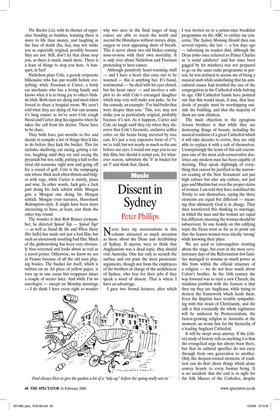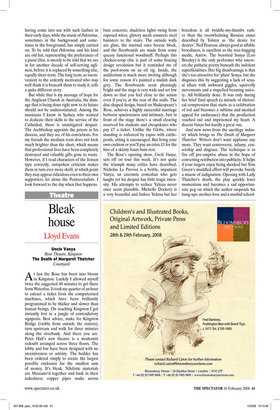Dissent in Sydney
Peter Phillips
Never have my asseverations in this column attracted so much attention as those about the Dean and Archbishop of Sydney. If anyone were to think that Anglicanism was a dead topic, they should visit Australia. One has only to scratch the surface and out pour the most passionate arguments, though not from the employees of the brothers in charge of the archdiocese of Sydney, who fear for their jobs if they speak a word of dissent. That is where I have an advantage.
I gave two formal lectures, after which I was invited on to a prime-time breakfast programme on the ABC to outline my concerns. The Sydney Morning Herald then ran several reports, the last — a few days ago — informing its readers that, although the Dean (who once referred to Prince Charles as ‘a serial adulterer’ and has since been gagged by his minders) was not prepared to go on the same radio programme in person, he was inclined to accuse me of being a musical snob while underlining that his anticultural stance had doubled the size of the congregation in the Cathedral while halving its age. Old Cathedral hands have pointed out that this would mean, if true, that hundreds of people must be worshipping outside the building, and that the majority of them are now children.
The main objection to the egregious Jensen brothers is that while they are destroying things of beauty, including the musical tradition of a great Cathedral which it will take decades to revive, they are only able to replace it with a cult of themselves. Unsurprisingly the terms of this cult encompass one of the most arch-conservative doctrines any modern man has been capable of devising. They speak slightingly of everything that cannot be justified in the narrowest reading of the New Testament: not just high culture but also any culture, not just gays and Muslims but even the proper status of women. I am told they have redefined the Trinity to suit themselves, saying the three elements are equal but different — meaning that ultimately God is in charge. They then transferred this thinking to marriage, in which the man and the woman are equal but different, meaning the woman should be subservient. In one homily on this edifying topic the Dean went so far as to point out that the Jensen women were ideally ‘strong’ while knowing their place.
We are used to televangelists strutting about the stage, but even in the most revolutionary days of the Reformation few families managed to assume as much power as this from within the official structure of a religion — we do not hear much about Calvin’s brother. In the 16th century the way forward was to start a new Church; the insidious problem with the Jensens is that they say they are Anglicans, while trying to destroy the framework which feeds them. Even the Baptists have trouble sympathising with this strain of Christianity, and the talk is that eventually the whole nightmare will be undercut by Pentecostalism, the fastest-growing religion in Australia at the moment: an ironic fate for the hierarchy of a leading Anglican Cathedral.
It will be swept away anyway. If the (élitist) study of history tells us anything it is that the evangelical urge has always been there, but that its cultural specifics do not carry through from one generation to another. Only the deepest-rooted elements of tradition can do that: those things which alone convey beauty to every human being. It is no accident that the end is in sight for the folk Masses of the Catholics, despite having come into use with such fanfare in their early days, while the music of Palestrina, sometimes in the background and sometimes in the foreground, has simply carried on. To be told that Palestrina and his kind are old hat, representing the preferences of a passé élite, is merely to be told that we are in for another decade of self-serving ugliness, before it is replaced by something else, equally short-term. The long term, so inconvenient to the ardently motivated who may well think it is beneath them to study it, tells a quite different story.
But while that is my message of hope for the Anglican Church in Australia, the damage that is being done right now to its future should not be underestimated. Among the musicians I know in Sydney who wanted to dedicate their skills to the service of the Cathedral, there is unmitigated despair. The Archbishop appoints the priests in his diocese, and they are of his convictions. For my friends the medium term does not look much brighter than the short, which means that professional lives have been completely destroyed and valuable gifts gone to waste. However, if I read characters of the Jensen type correctly, outspoken criticism makes them in turn ever more shrill, at which point they may appear ridiculous even to their own supporters, let alone the Pentecostalists. I look forward to the day when that happens.



















































































 Previous page
Previous page